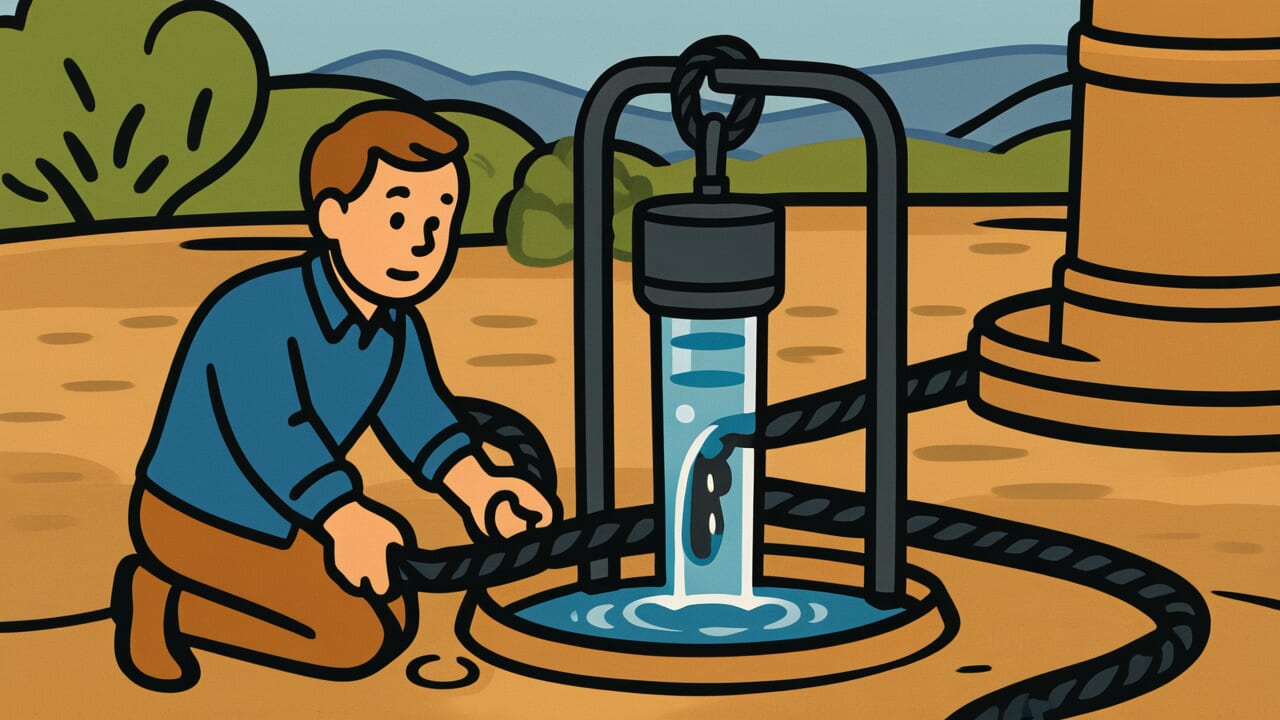How to Read “A short rope cannot draw water from a deep well”
Tankō wa motte shinsei no izumi o kumu bekarazu
Meaning of “A short rope cannot draw water from a deep well”
This proverb means that you cannot accomplish big tasks when your abilities or resources are insufficient.
Just as a short rope cannot reach the water in a deep well, you won’t achieve your desired results no matter how hard you try if your skills and preparation don’t match your goals.
People use this saying to advise someone who’s trying to tackle a big project without enough ability. It’s also used for self-reflection when you realize you’re not prepared enough.
The reason for using this proverb isn’t just to say “it’s impossible.” It’s to emphasize the importance of first building the necessary skills.
Today, this expression applies when someone tries to take on difficult work without proper qualifications or experience. It also fits situations where people start large-scale projects without enough budget or staff.
The key point is that the proverb doesn’t tell you to give up on your goals. Instead, it teaches the importance of preparing adequately to match them.
Origin and Etymology
This proverb likely comes from an expression in the “Zhile” chapter of the ancient Chinese text “Zhuangzi.”
“Tankō” means a short rope, and “shinsei” refers to a deep well. The phrase describes a very concrete situation where a short rope simply cannot draw up water from a deep well.
In ancient China, wells were central to daily life. Drawing water was an everyday task. Preparing a rope of appropriate length for the well’s depth was absolutely basic for getting water.
Zhuangzi used this obvious fact as a metaphor to explain the relationship between human abilities and goals.
The proverb came to Japan along with classical Chinese learning. It became popular among educated people during the Edo period.
Because of its formal classical Chinese style, people used it more in writing and formal situations than in everyday conversation.
What’s interesting is that this proverb isn’t just a passive warning to “not overreach.” It contains a positive meaning: “To do big work, you need appropriate preparation.”
If you only have a short rope, don’t challenge a deep well. First, prepare a long rope. This practical wisdom is embedded in the saying.
Usage Examples
- I want to start a new business, but “a short rope cannot draw water from a deep well”—I need to secure funding and personnel first
- He’s asking to be assigned a major project despite his limited experience, but “a short rope cannot draw water from a deep well”
Universal Wisdom
This proverb has been passed down through generations because it perfectly captures a universal human struggle: the gap between ambition and reality.
Everyone has big dreams. The desire to challenge high goals is what drives human growth.
But at the same time, we tend to overestimate our abilities or underestimate the importance of preparation. We convince ourselves that passion alone will be enough and neglect to build a solid foundation.
The deep insight this proverb offers is that failure comes not from “attempting the challenge” but from “insufficient preparation.”
Challenging a deep well isn’t bad in itself. The problem is challenging it with a short rope.
Our ancestors witnessed many people fail because they took preparation lightly. Even with talent and ambition, you cannot reach your goal without appropriate means.
They expressed this harsh reality through the everyday image of a well and rope.
At the same time, this proverb contains hope. If you want to draw water from a deep well, just prepare a long rope.
In other words, there’s a positive message hidden here: with proper preparation, even big goals become achievable.
When AI Hears This
Systems thinking pioneer Donella Meadows pointed out that the most effective “leverage points” for intervening in complex systems lie at deep levels.
The relationship between the short rope and deep well in this proverb physically represents exactly this “mismatch between intervention depth and tool reach.”
What’s interesting is that when people face problems, they often start working without accurately measuring their rope length or checking the well’s depth.
When companies introduce new systems, their budget and personnel—their “rope length”—are limited, yet they try to tackle organizational culture change, a “deep well.”
As a result, the rope stops partway down, stirring only the surface. Meadows called this “parameter tinkering” and warned that interventions that don’t reach a system’s deep structure have little effect.
Even more important is the reverse truth: a short rope works perfectly fine for a shallow well.
In other words, the problem isn’t “having a short rope” but “not choosing a well that matches your rope’s length.”
Modern people often continue mismatched challenges without measuring their available resources or assessing the problem’s depth.
This proverb has been teaching “reachability calculation” before intervention—the first step in system intervention—for 2,000 years.
Lessons for Today
This proverb teaches us that having dreams and facing reality don’t contradict each other.
If you have a big goal, that’s wonderful. But at the same time, calmly assess where you are now.
What are you lacking? What should you prepare? Figuring this out is actually the first step toward achieving your goal.
Modern society has a tendency to demand immediate results. But the more valuable the work, the more it requires a solid preparation period.
Getting qualifications, gaining experience, expanding your network, saving money—these steady preparations are what lengthen your “rope.”
What matters is not thinking of preparation time as wasted. The time spent weaving a long rope to draw water from a deep well is never a detour.
It’s a necessary process for surely approaching your goal.
Don’t rush, but be steady. Start preparing today the “long rope” that will reach your target “deep well.”
When your preparation is complete, you will surely be able to draw water from the deep spring.



Comments